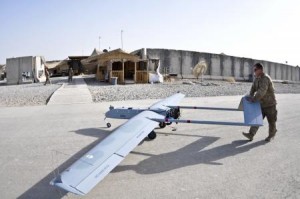
Paratroopers from the same brigade – the 425th Brigade special Troops Battalion on JBER – will also be testing out some drones while they’re in Anchorage.
The drones, or unmanned aerial systems, are non-lethal aircraft.
They have a 14-foot wingspan and are about the size of a really small one-passenger plane.
They’re operated remotely from the ground by the paratroopers.
Officials say the drones could be flying over JBER as soon as Friday.
The aircraft will remain over the base at all times, mostly in restricted airspace.
It’s the first time drone training has been approved for JBER in Anchorage.
Daysha Eaton is a contributor with the Alaska Public Radio Network.
Daysha Eaton holds a B.A. from Evergreen State College, and a M.A. from the University of Southern California. Daysha got her start in radio at Seattle public radio stations, KPLU and KUOW. Before coming to KBBI, she was the News Director at KYUK in Bethel. She has also worked as the Southcentral Reporter for KSKA in Anchorage.
Daysha's work has appeared on NPR's "Morning Edition" and "All Things Considered", PRI's "The World" and "National Native News". She's happy to take assignments, and to get news tips, which are best sent via email.
Daysha became a journalist because she believes in the power of storytelling. Stories connect us and they help us make sense of our world. They shed light on injustice and they comfort us in troubled times. She got into public broadcasting because it seems to fulfill the intention of the 4th Estate and to most effectively apply the freedom of the press granted to us through the Constitution. She feels that public radio has a special way of moving people emotionally through sound, taking them to remote places, introducing them to people they would not otherwise meet and compelling them to think about issues they might ordinarily overlook.




